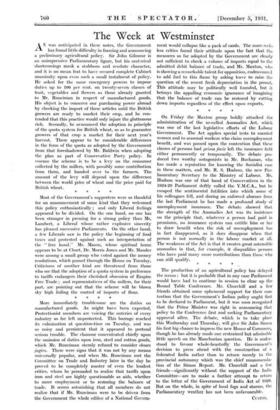The Week at Westminster
AS was anticipated in these notes, the Government has found little difficulty in framing and announcing a preliminary agricultural policy. Sir John Gilmour is an unimpressive Parliamentary figure, but his oratorical shortcomings mask a stubborn and resolute character, and it is no mean feat to have secured complete Cabinet unanimity upon even such a small instalment of policy. He asked for the same emergency powers to impose duties up to 100 per cent. on twenty-seven classes of fruit, vegetables and flowers as those already granted to Mr. Runciman in respect of manufactured goods. His object is to conserve our purchasing power abroad by checking the import of these articles until the British growers are ready to market their crop, and he con- tended that this practice would only injure the gluttonous rich. Secondly, he announced the adoption in principle of the quota system for British wheat, so as to guarantee growers of that crop a market for their next year's harvest. There appear to be considerable differences in the form of the quota as adopted by the Government from that foreshadowed by Mr. Baldwin when adopting the plan as part of Conservative Party policy. In essence the scheme is to be a levy on the consumer collected by the millers, with possibly some contribution from them, and handed over to the farmers. The amount of the levy will depend upon the difference between the world price of wheat and the price paid for British wheat.










































 Previous page
Previous page